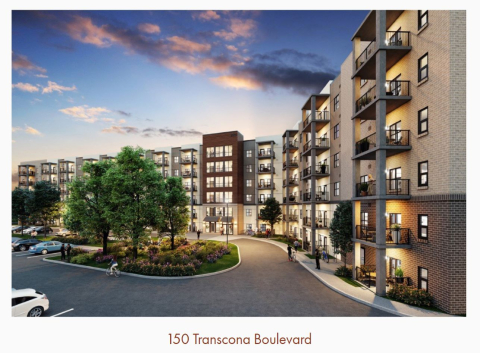
The Rental Construction Financing Initiative (Purpose-Built Rentals)


The Rental Construction Financing Initiative (RCFi) provides low-cost loans to encourage the construction of sustainable rental apartment projects. In November 2023, the 2023 Fall Economic Statement announced that they are going to rename the RCFi program to the Apartment Construction Loan Program. Starting in 2025/26, with $15 billion more in funding to build more rental apartments, the name change will happen at the beginning of 2024.
On November 17th, 2023, the Government of Canada announced they are going to build 447 purpose-built rental homes. The RCFi will provide over $132 million for these 2 projects in Winnipeg.
At 347 Oakdale Drive, this development will have 270 units across three buildings. In ‘Building B’, they will have a 55+ Active Living Centre which will provide accessible rental housing for seniors. All the residents in these buildings will have access to a gym, lobby lounges, above and underground parking. Utilities and in-suite laundry will also be included in the rent. The construction for this project began in May 2023 and is expected to be completed in April 2025.

The other build project started in April 2022 and was recently completed on November 1st, 2023. Park City Commons – Building PQ (Pre-Qualification) at 150 Transcona Boulevard. 177 low-rise apartment units have 1 to 3 bedrooms. All the tenants will also have access to a gym, lobby lounges, above and underground parking, and all the units have in-suite laundry, and the utilities will be included in the rent.
These builds were made possible because of the Government of Canada’s National Housing Strategy (NHS), through the Rental Construction Financing Initiative (RCFi) with over $132 million as fully repayable, low-interest loans:
- 347 Oakdale Drive @ $86.75 million (RCFi) for 270 units
- 150 Transcona Boulevard @ $45.67 million (RCFi) for 150 units
The RCFi is a part of the National Housing Strategy, and over the next 10 years, the NHS will invest in over $82 billion to help transform the housing crisis across Canada. The RCFi is one of the many programs and initiatives designed by the NHS to address the needs of people across the Housing Continuum chart:

This initiative focuses on the funding for an affordable, stable supply of purpose-built rental housing for people with lower income households.
What are purpose-built rentals?
Purpose-built rental (PBR) developments were designed to be ‘rented’ as an individual apartment, instead of selling it as a condo. PBRs are made to be rented out, most likely by a corporation acting as the landlord. Like condos, PBRs are tall buildings with amenities such as a gym, lobby lounges, with an above or underground parking space.
PBRs are in high demand currently. Houses are so expensive, and more millennials (people born between 1981 to 1996) and Gen Zers (people born between 1997 and 2012) are more likely to live in rentals than owning a home because of the price. However, housing rentals are becoming more unavailable and the demand for housing, paired with low interest rates, are leading developers to make the switch to PBRs.
The federal government is encouraging developers to build more than 71,000 PBR units across the country. Developers must set their rent rates below the market value to ensure they qualify for the program. Canada is rapidly growing with its population and housing is an important issue as housing is a basic human right. The rental stock in Canada is declining and aging, and the construction of rental homes has not kept up with rapidly growing Canadian families.

“We need to boost housing supply; this is why our government will continue to make strategic investments through programs like the Rental Construction Financing Initiative to incentivize the development of much-needed rental units. Programs like RCFi showcase our government’s commitment to addressing the pressing housing challenge faced by communities from coast to coast. These investments will help increase the housing supply, and the federal government will continue backing them so that all Canadians have a safe and secure place to call home.”
— The Honourable Sean Fraser, Minister of Housing, Infrastructure and Communities
“It is crucial for the federal government to work with our partners to ensure that every Canadian has a safe place to call home. Announcements like today are a real example of how our government is taking quick action to increase the supply of new rental units across the country. This investment will not only support 447 families right here in Winnipeg but will also allow them to live in an inclusive community that provides better access to services that meet their needs. I am pleased to see our National Housing Strategy making a difference in the lives of all Canadians through innovative programs like the RCFi.”
— The Honourable Dan Vandal, Minister of Northern Affairs and Minister responsible for PrairiesCan and CanNor
The CMHC website at https://www.cmhc-schl.gc.ca/professionals/project-funding-and-mortgage-financing/funding-programs/all-funding-programs/rental-construction-financing-initiative has information about how developers on the East coast on Prince Edward Island have used the funds from the RCFi to increase the rental apartments available in their community, as well as other success stories. The website also shares descriptions of the benefits of the loan offer and everything you need to know before you apply. For example, what the loan can offer, favourable terms and details, Manitoba’s approved National Housing Act lenders (Credit Unions), eligibility details of the building, and the financial ability to operate successfully.

Along with the Ministerial Loan Guarantee, the CMHC is accepting four types of additional security for housing projects on First Nations land. Most programs at the CMHC for the National Housing Strategy have funding programs for many different kinds of projects. Some of these projects may require ‘Alternative Types of Security’- Pledge of Land, Leasehold Interest, Business Revenue and Personal Property and Letter of Credit. The CMHC Rental Construction Financing Initiative provides funding to eligible borrowers during the risky phases of an apartment build. This initiative focuses on apartment projects, where they need housing to rent.
If you need more information, contact your CMHC Housing Solutions Specialist, gather your required documentation, and ensure you fill out the complete application for the specific program or initiative. A downloadable PDF file is also available for you called “Required Documentation” which provides a checklist of what your project is, the size of the building and how many units, project lands, any specifications, project approvals, and the Social Outcome Grid (Excel Spreadsheet).
By: Tricia Cook, Content Navigator